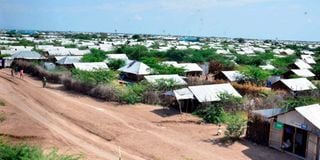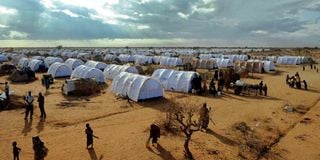US pleads with Kenya against closure of Kakuma, Dadaab refugee camps

Kakuma Refugee Camp, located along Kenya's border with Somalia, as pictured on June 10, 2018.
What you need to know:
- In a virtual meeting with President Uhuru Kenyatta, Mr Blinken reiterated his government’s support for Kenya’s refugee protection, security and health.
US Secretary of State Antony Blinken on Tuesday implored Kenya to relax its planned closure of refugee camps even as Washington promised more funding to help those fleeing trouble in the region.
Mr Blinken met, virtually, with President Uhuru Kenyatta where he generally called for more cooperation on security, health and human rights. But his office had preceded the meeting with calls to relax an imminent closure of the two refugee camps in Dadaab, Garissa County and Kakuma in Turkana.
A Statement from State House did acknowledge that refugee situation, human rights, health and climate change were additional issues raised during the meeting which centred on trade and investment.
“Also discussed was Kenya’s elevated role in regional peace and security as a member of the UN Security Council. Other matters discussed by President Kenyatta and Secretary Blinken were human rights, refugees, health and climate change,” said Kanze Dena Mararo, the State House Spokesperson.
A trade deal between the two countries is pending. But the immediate issue had been Kenya’s desire to close Dadaab and Kakuma refugee camps, both of which host more than 400,000 refugees.
US concerned
Ahead of the virtual meeting, former US Ambassador to Kenya Bob Godec, now Acting Assistant Secretary of State for African Affairs, told journalists the US was concerned about the imminent closure.
“I’ve spoken with the Kenyan leaders myself about this issue. And the Kenyans have committed to live up to their international commitments with respect to the refugees, and we welcome that commitment. We expect them to do it. It is a subject of ongoing discussion”.
He added that UNHCR had provided a proposal on a way forward.
“And we understand the Kenyans accepted it. We hope, again and expect that the Kenyans will live up to their international commitment and that this matter can be resolved,” said Godec.
Mr Blinken said the US has provided $106 million for refugee protection and humanitarian assistance to Kenya “as it provides regional leadership by hosting refugees and asylum seekers from Somalia, South Sudan, the Democratic Republic of the Congo, Ethiopia, and elsewhere.”
The camps have been controversial, with Nairobi accusing some inhabitants of fomenting terror cells in the country. A High Court decision on Tuesday, incidentally suspended the plans to shut it down.
Washington also said it had provided some $23 million for health and economic effects of Covid-19.
Earlier, Mr Blinken used a virtual session with African youth to call for more opportunities for the young on the continent, and issued an indirect jab at China’s opaque operations.
In a virtual meeting with the alumni of Young African Leaders Initiative (Yali), Mr Blinken said Africa’s youthful population will remain its biggest resource, but as long as governments run programmes that are inclusive and provide opportunities.
“We know that to really feel engaged and to really be inspired, people need to feel that they’re being heard – because speaking into a void can be an incredibly frustrating exercise.
“So I think young voices are critical to any political discourse, for example, on electoral and constitutional reforms. And that’s certainly true in the run-up to elections in 2022 in Kenya,” he told a group of YALI alumni scattered across the continent in countries including Kenya, Nigeria, South Africa and Cape Verde.

A file photo taken on July 31, 2011, shows Somali refugees walking in the new Ifo-extension at the Dadaab refugee camp in Kenya, the largest refugee camp in the world.
Good governance
Mr Blinken called for open democratic governance, and inclusivity in order to contribute to the growth of African economies.
“No one has monopoly of ideas. We need to listen to new ideas… and I just hope that the African youth can have open ears and open minds.”
He chose to speak with Yali alumni as he kicked off his ‘virtual trip’ to Africa where he was also expected to speak with President Muhammadu Buhari of Nigeria at a separate session.
Yali, an Obama-era programme is Washington’s programme to work with the youth, seen as Africa’s next generation of leaders. It currently has about 700,000 members but had taken a lull during Donald Trump’s Presidency. a
It marks ten years this year and Mr Blinken’s meeting tackled issues that trump had either avoided or was lukewarm about. They included climate change, gender equality and trade and investment; which have become President Joe Biden’s pet subjects.
It was a remarkable difference in the two administrations: Trump never visited Africa, a continent he and also described as ‘shithole’.
His first Foreign Secretary Rex Tillerson was fired while on a physical trip to Kenya in 2018. His successor Mike Pompeo’s trips in Africa never touched YALI.
Yet Mr Blinken still ventured into a critique of China’s programmes in Africa, just as his predecessor Pompeo did often.
Global relations
In responding to a question from a member from Nigeria on whether Washington will compete with Beijing on the continent, Mr Blinken said Africa should deal with a wide range of partners, as long the benefits reach the people.
“First, Africa, countries in Africa will and should engage with a broad array of partners, whether it’s China or France, Turkey or Brazil, the United States or many others.
“And my hope is that African countries and African communities just approach those relationships with your eyes wide open.
“China is a global competitor, and competition is a good thing as long as it’s basically fair and the playing field is level. But as we look at it, we have different approaches to governance; we have different approaches to business; we have different approaches to security. And the fundamentals sometimes of our partnerships are quite different.”
The US has accused China of burdening Africa with debt, something the Chinese have refuted on numerous occasions.
The Chinese, now the biggest infrastructure builders on the continent, have recently ran into controversy over debt situations in a number of countries such as Kenya, Djibouti, Ethiopia, Zambia and Angola. With the contracts often hidden from the public, the US has argued it may mean severe penalties for defaulting countries, including attachment of crucial assets.
“We’re not asking anyone to choose between the United States or China, but I would encourage you to ask those tough questions, to dig beneath the surface, to demand transparency, and to make informed choices about what is best for you and your countries.






